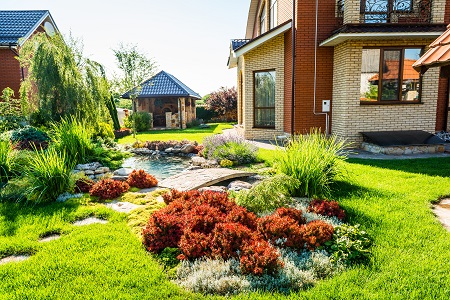Climate Change Can Affect Your Garden
 Climate change is all over the news these days. The seriousness of the situation cannot be underestimated. However, while the global implications may be difficult to grasp in their entirety, climate change is affecting you directly in your home right now. Besides increased heating and cooling bills and more frequent health problems, your garden is also affected by climate change.
Climate change is all over the news these days. The seriousness of the situation cannot be underestimated. However, while the global implications may be difficult to grasp in their entirety, climate change is affecting you directly in your home right now. Besides increased heating and cooling bills and more frequent health problems, your garden is also affected by climate change.
What You Should Look For
Climate change is a slow insidious process that has been going on for decades. The effects are becoming apparent only now. The same is true for your garden. The changes have been happening for a long time, but have been so slow as to be unnoticeable. It’s time to take a good look and see how the changing environment is affecting your landscape.
- Are some plants flowering early?
- Are others postponing their flowering?
- Are others falling victim to frost?
- Is pollination becoming an issue? Are the birds and insects that pollinate your plants’ flowers arriving at the wrong time or not appearing at all?
- Are plants that require cross-pollination suffering because the different species are not blossoming at the same time, as they used to do?
- Is the climate changing where you live? Are the seasons getting longer or shorter and are they warmer or colder than they used to be?
- What about rain? Is there more or less of it than there used to be? Does it happen at the same time of year?
- While lower rainfall will dry out the garden, an excess can result in topsoil runoff and compacted soil.
Also Read: Getting Your Garden Ready for Summer
What You Can Do
You can’t reverse climate change on your own. However, you can take steps to protect the landscape.
- Conserve water. There are various things you can do to achieve this.
- Mulching enables the earth to retain moisture.
- Use rain barrels to capture rainwater.
- Install a water irrigation system to ensure efficient water use. A drip irrigation system for the landscape is often the best option.
- Improve your composting efforts. Besides enriching the soil, composting kitchen and garden waste gives you an environment-friendly alternative to chemical fertilizers.
- Plant trees where possible. Not only will they absorb carbon pollution from the outdoor atmosphere, but the shade will also help protect the plants below from excess heat.
- Ask a landscaping expert to have a look at your garden and suggest ways to keep it safe and healthy.
Also Read: Top Reasons Your Lawn Needs an Irrigation System
Climate change can be stopped or even reversed. But it will take many decades for the improvements to be noticeable. What you must remember is that it is affecting your garden today. The signs are difficult to spot and are often only noticed by a trained expert eye. You should consider acting now to protect your landscape from the ravages of a changing climate and the right way to do this is to consult a landscaping professional. Local landscaping services will know what to look for, how to deal with the problems that may be developing, and what actions to take to prevent more climate-related damage from occurring in the future. Keeping your family safe and protecting your future starts with protecting your home, both inside and out.
- Apr 19, 2023
